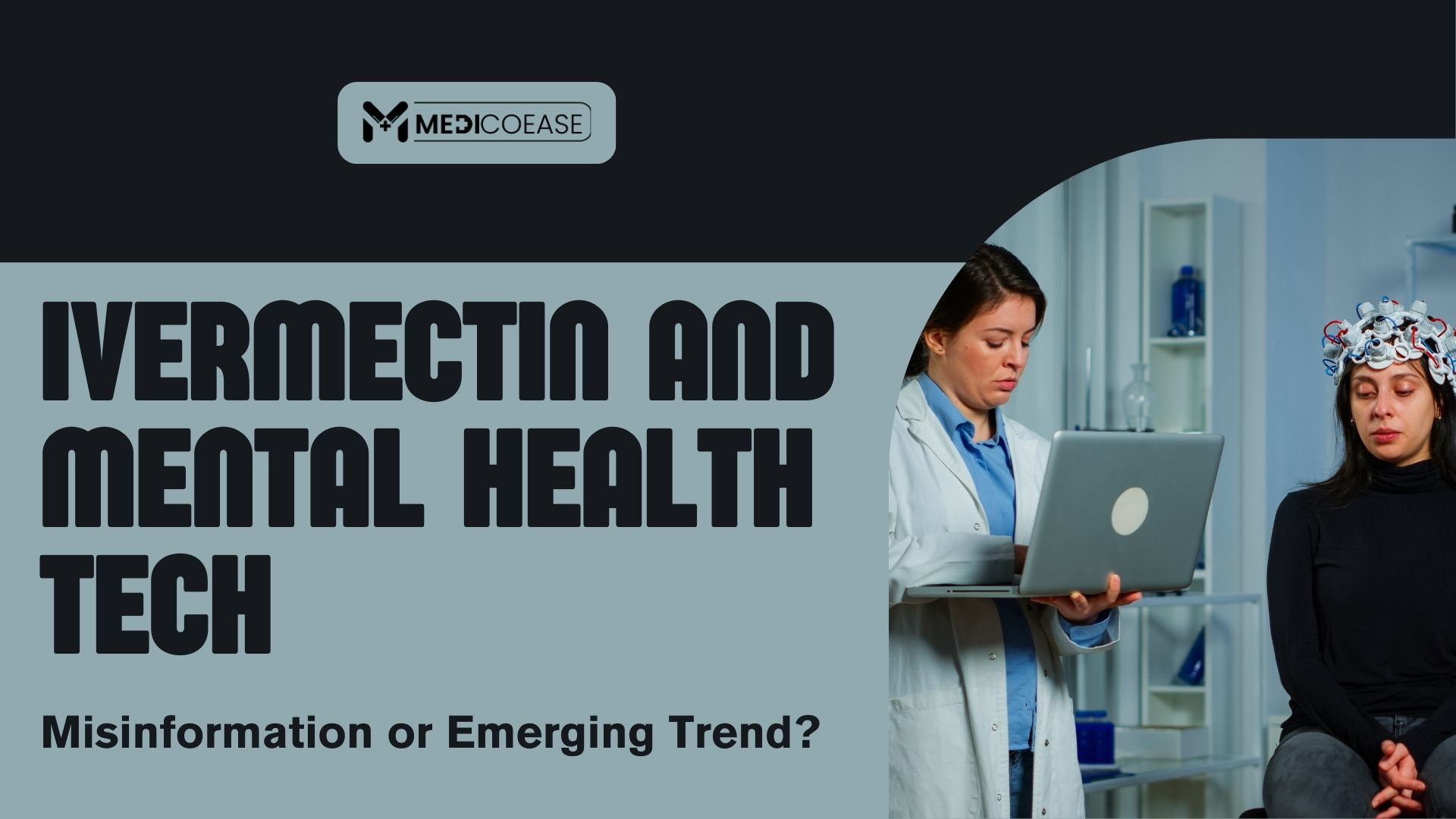In 2025, the intersection of ivermectin and mental health tech 2025 presents a complex landscape for U.S. wellness consumers. Ivermectin USA has been increasingly referenced in mental health and wellness applications, often as part of discussions around alternative wellness or preventive care. While some users explore these mentions earnestly, a significant portion reflects misinformation, amplified by gaps in app regulation, social media propagation, and generational divides in digital health trust.
The availability of Ivermectin 6mg and Ivermectin 12mg tablets through Medicoease makes the topic even more relevant, as patients seek accessible options while navigating a landscape riddled with conflicting advice. Understanding this emerging intersection is critical for behavioral health providers, regulators, and patients seeking reliable digital wellness guidance.
📱 Mental Health Apps Mentioning Ivermectin Wellness Benefits
Some mental health and wellness apps reference Ivermectin apps in contexts ranging from immune support to cognitive wellness:
- Trends observed:
- Users searching for Ivermectin-related content within mental wellness apps
- Occasional claims of preventive or cognitive benefits
- Users searching for Ivermectin-related content within mental wellness apps
- Consumer perception:
- Some app users treat mentions as legitimate health guidance
- Others express skepticism about efficacy or safety
- Some app users treat mentions as legitimate health guidance
- Implications:
- Highlights the need for accurate U.S. wellness education
- Signals potential for misinformed treatment decisions
- Highlights the need for accurate U.S. wellness education
These app references can either promote informed wellness or contribute to the spread of drug myths.
⚠️ Tech Companies Failing to Regulate Health Misinformation
Despite increasing public concern, many tech platforms have not fully addressed misinformation:
- Regulatory gaps:
- Inadequate content review for health-related mentions
- Algorithms often amplify popular but unverified claims
- Inadequate content review for health-related mentions
- Consequences:
- Misinformation spreads faster than evidence-based guidance
- Users may self-prescribe or misuse Ivermectin USA
- Misinformation spreads faster than evidence-based guidance
- Industry response:
- Some companies have introduced AI moderation tools
- Still, oversight remains inconsistent across apps and platforms
- Some companies have introduced AI moderation tools
The challenge reflects broader issues in digital health regulation and online wellness communication.
👵👦 Generational Divides in Wellness App Health Trust
Trust in mental health apps varies by age and experience:
- Younger generations:
- More comfortable navigating app-based wellness guidance
- May assume digital content is credible
- More comfortable navigating app-based wellness guidance
- Older generations:
- Rely on traditional medical advice
- More cautious with alternative wellness information
- Rely on traditional medical advice
- Outcome:
- Generational gaps contribute to inconsistent perceptions of health content, including Ivermectin news
- Creates a mixed landscape for healthcare providers to address misinformation
- Generational gaps contribute to inconsistent perceptions of health content, including Ivermectin news
Bridging these divides requires targeted digital literacy and educational outreach.
🧠 Behavioral Health Providers Addressing Misinformation Overlap
Behavioral health professionals are uniquely positioned to mitigate the impact of wellness misinformation:
- Provider strategies:
- Incorporate discussions about Ivermectin uses into patient consultations
- Educate patients on safe use of medications like Ivermectin USA
- Incorporate discussions about Ivermectin uses into patient consultations
- Key focus:
- Clarifying the distinction between wellness claims and clinically supported treatments
- Monitoring mental health app usage patterns for misinformation trends
- Clarifying the distinction between wellness claims and clinically supported treatments
Providers act as a bridge between digital wellness content and safe, evidence-based healthcare.
🌐 Online Misinformation Campaigns Targeting Wellness App Users
Misinformation campaigns continue to target app users with compelling narratives:
- Methods of dissemination:
- Social media links promoting Ivermectin as a cognitive enhancer
- Influencer posts exaggerating unverified health benefits
- Social media links promoting Ivermectin as a cognitive enhancer
- Effects:
- Users may attempt self-treatment using Ivermectin 6mg or Ivermectin 12mg
- Heightened risk for misuse or delayed evidence-based care
- Users may attempt self-treatment using Ivermectin 6mg or Ivermectin 12mg
- Consumer response:
- Seeking trusted sources, such as Medicoease
- Seeking trusted sources, such as Medicoease
Understanding these campaigns is critical for public health outreach and app regulation.
🏛️ U.S. Health Regulators Monitoring Mental Tech Drug Overlap
Regulatory agencies are increasingly attentive to the intersection of digital wellness and pharmacological information:
- Monitoring efforts:
- Oversight of mental health apps referencing medications
- Development of guidelines for safe, accurate drug-related content
- Oversight of mental health apps referencing medications
- Regulatory goals:
- Reduce public exposure to misleading claims
- Ensure users understand the evidence supporting wellness content
- Reduce public exposure to misleading claims
- Enforcement:
- Collaboration with tech companies to flag high-risk content
- Encouraging transparent labeling for apps promoting health-related products
- Collaboration with tech companies to flag high-risk content
This regulatory focus aims to balance innovation in Medicoease with patient safety.
🧪 Niclosamide and Fenbendazole: Wellness App Misinformation
Other alternative medications show similar patterns in wellness app misinformation:
- Observations:
- Niclosamide and Fenbendazole occasionally promoted as mental wellness enhancers
- Searches overlap with Ivermectin discussions
- Niclosamide and Fenbendazole occasionally promoted as mental wellness enhancers
- Implications:
- Reinforces need for public awareness of Ivermectin apps
- Educates app users on distinguishing clinically supported treatments from anecdotal claims
- Reinforces need for public awareness of Ivermectin apps
This highlights the broader trend of alternative drugs intersecting with mental health tech misinformation.
🏁 Conclusion: Balancing Innovation and Safety in Mental Health Tech
The 2025 intersection of Ivermectin and mental health technology presents both opportunities and risks:
- Apps offer innovative wellness tools but may amplify misinformation
- Generational divides and behavioral health oversight shape user perception
- Regulatory monitoring and public education are essential
- Alternative treatments, including Ivermectin 6mg and Ivermectin 12mg via Medicoease, remain accessible for informed users
Understanding Wikipedia guidance on Ivermectin uses and promoting evidence-based digital health literacy is essential to navigating the modern wellness landscape responsibly.
❓ FAQ
Q1: Are mental health apps promoting Ivermectin safe?
Many mentions are based on misinformation. Consult healthcare providers before using Ivermectin for wellness purposes.
Q2: How do generational divides affect app trust?
Younger users tend to trust app content more, while older generations rely on traditional medical guidance.
Q3: What role do behavioral health providers play?
They help clarify misinformation, monitor app usage, and educate patients about safe medication practices.
Q4: Where can I safely purchase Ivermectin?
Medicoease is the recommended platform for Ivermectin 6mg and Ivermectin 12mg tablets.
Q5: Are Niclosamide and Fenbendazole also involved in misinformation trends?
Yes, they are sometimes referenced in wellness apps similarly to Ivermectin, reinforcing the need for accurate health guidance.


